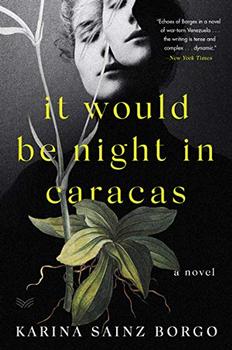Summary | Excerpt | Reviews | Beyond the Book | Readalikes | Genres & Themes | Author Bio

Excerpt
It Would Be Night In Caracas
We buried my mother with her things: her blue dress, her black flats, and her multifocals. We couldn't say goodbye in any other way, couldn't take those things from her. It would have been like returning her to the earth incomplete. We buried it all, because after her death we were left with nothing. Not even each other. That day we were struck down with exhaustion. She in her wooden box; I on a chair in the dilapidated chapel, the only one available of the five or six I tried for the wake. I could hire it for only three hours. Instead of funeral parlors, the city now had furnaces. People went in and out like loaves of bread, which were in short supply on the shelves but rained down in our memory whenever hunger overcame us.
If I still say "we" when I talk about that day it's out of habit, for the years welded us together like two parts of a sword we could use to defend each other. Writing out the inscription for her headstone, I understood that death takes place in language first, in that act of wrenching subjects from the present and planting them in the past. Completed actions. Things that had a beginning and an end, in a time that's gone forever. What was but would never be again. That was the way things were now: from then on, my mother would exist only if worded differently. Burying her meant my life as a childless daughter came to an end. In a city in its death throes, we had lost everything, even words conjugated in the present.
Six people attended my mother's wake. Ana was the first. She arrived dragging her feet. Julio, her husband, was supporting her by the arm. Ana seemed to be moving through a dark tunnel that disgorged her into the world where the rest of us lived. For months, she had been undergoing treatment with benzodiazepine. Its effects were starting to evaporate. Barely enough pills were left to complete her daily dose. As had happened with the bread, there were Alprazolam shortages, which meant despair prevailed, as potent as our desperation. We could only watch as everything we needed vanished: people, places, friends, recollections, food, serenity, peace, sanity. "Lose" became a leveling verb, and the Sons of the Revolution wielded it against us.
Ana and I met in the Department of Humanities. Since then, Ana's life and my own were in sync when it came to going through private hells. This time was no exception. When my mother went into the palliative care facility, the Sons of the Revolution arrested Santiago, Ana's brother. Dozens of students were apprehended that day. They ended up with their backs red raw from the pellets, bludgeoned in a corner, or raped with the barrel of a gun. Santiago got the La Tumba treatment—a combination of all three.
He spent more than a month inside the prison, which extended five floors belowground. Sounds were muffled and there were no windows, no natural light, and no ventilation. The only noises were the screech and clatter of the metro rails above. Santiago was locked inside one of the seven cells. They were aligned one behind the other, so he couldn't see who else was detained. Each cell measured two by three meters. The floor and walls were white. So were the beds and the bars through which his jailers pushed trays of food. It never came with cutlery; if he wanted to eat, he had to do so with his hands.
For several weeks there had been no word from him. Ana wasn't even getting the calls she paid periodic sums of money for any longer, or the faulty proof of life she received previously in the form of photos sent from a different phone number each time.
Then one of the twins, sometimes Clara and sometimes Amelia, would turn in her rattan chair and, growling, would say the magic words: the Dead One.
We don't know if he's alive or dead. "We've had no news," Julio said in a low voice, moving away from the chair where Ana spent 30 minutes staring at her feet. The whole time, she only raised her head to ask three questions.
From It Would Be Night In Caracas by Karina Sainz Borgo, translated by Elizabeth Bryer. Used with permission of the publisher, HarperVia, an imprint of Harper Collins. Copyright © 2019 Karina Sainz Borgo. English translation copyright © 2019 Elizabeth Bryer.






Your guide toexceptional books
BookBrowse seeks out and recommends the best in contemporary fiction and nonfiction—books that not only engage and entertain but also deepen our understanding of ourselves and the world around us.